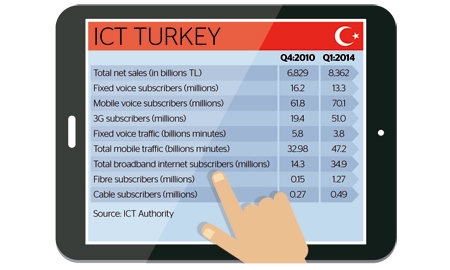Part of the reason for Turkey’s unparalleled growth rate of 7-8 per cent during an otherwise globally difficult economic climate is due to the country’s expanding ICT sector, which has always grown by more than 10 percent, Dr. Tayfun Acarer, Chairman of the ICT Authority, says.
Dr. Arcarer cites several factors for this successful growth, including Turkey’s young population and the usage life of mobile phones in the country. “Almost 50 percent of the Turkish population is under the age of 26,” he says. Because of Turkey’s young population, many students are using smartphones, which “may have more advantages compared to computers,” says Dr. Acarer. “Last year, approximately 16 million mobile phones came to Turkey, and more than 42 percent of these phones were smartphones.”
An upcoming education project with a budget of at least $7 or $8 billion seeks to pair every one of Turkey’s 16 million primary and secondary students with tablets, and to put an iBoard in each of Turkey’s 40,000 primary and secondary ICT classrooms. “In four years, every single student will have received a tablet computer, and this has already started,” explains the ICT Authority Chairman. This will, in turn, create a need for broadband and internet access in students’ and educators’ homes, allowing companies like Türk Telekom to work with the government to enhance the private sector through public partnerships.
For this to happen, however, ICT fixed and mobile infrastructure will have to be disseminated not only in more populous cities like Ankara, but also in its 1,799 rural settlements as well. There is a fund for that, where about $400 million is accumulated every year to provide support for this infrastructure, Dr. Acarer explains. This is known as a universal service fund, and its support and transparency help to establish trust between the population and the ICT sector.

0 COMMENTS